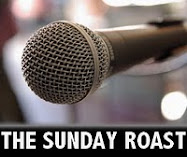I was greeted at the top step of our dugout by Coach Fellin. He was not happy.
"Threw the helmet, huh?" he asked softly.
"Coach, that pitch was LOW!" I responded.
"Yep."
"That ump's a blind buffoon!" At age ten, I hadn't yet learned the word "douchebag."
"I dunno. A little near-sighted, maybe."
Since I was the third out, I retrieved my glove from its spot under the bench and started out of the dugout toward my post at third base.
"You won't need the glove, Chris, you're done for the night."
"But COACH!"
"Reds don't throw equipment. Have a seat."
Boy was I upset. I hated being taken out of a game - ever - but especially for something so stupid. After I calmed down, Coach Fellin joined me on the bench."You know, it hurts the team and makes us all look bad when you act like that," he said. His voice was only a few notches above a whisper, but the look of disappointment in his eyes was far worse than hysterical, spittle-spraying rage will ever be.
"I know, Coach. I'm sorry. It won't happen again," I said, meaning every single word of it.
"Okay then." He took his usual place on the top step of the dugout, watching the action on the field while I sat stewing at the end of the bench.
A few minutes later, he came over and sat down next to me.
"Pretty exciting game tonight, huh? That pitcher they got out there is tough, ain't he?" he asked.
"You're not kidding."
"Especially when the ump's giving him that low strike, right?"
He grabbed the bill of my cap and pulled it down over my eyes as we both chuckled.
And that was it.
Coach Fellin made sure that I knew two things that night. One, that I'd made a mistake and embarrassed myself and the team, and two, that even though I'd messed up, he didn't like me any less. Since we all basically worshipped the guy, his approval meant everything to us.
I played on the Reds for two seasons, 1976 and 1977, and at that point, Coach Fellin had already been at it for a decade. He couldn't have taken this job more seriously if he'd been coaching the New York Yankees. He kept a red three ring binder, dubbed "The Reds Bible", detailing the results, score sheets, and player stats for every season he coached and he made sure we knew the history. Best single season batting average? Kenny Kellerman, .685. Most home runs in a season? Dickie Myers, 11.
If practice was scheduled for 4:00, we were expected to hit the field at 3:45. This wasn't a problem for me personally, since my dad preached the philosophy "Early is on time, on-time is late" from the time I was, well, born. By holding us to that standard, Coach Fellin squeezed every minute out of our practice sessions. And he made sure that our practices were fun as well as productive. We spent a lot of time working on specific situations, so that when they would come up in a game we wouldn't panic. "Before every pitch, you gotta know what you're gonna do with the ball if it comes to you," he'd say. Over and over. Sure he was our coach, but he was a teacher too.
Coach Fellin always emphasized that character and effort were more important than ability. We were to play hard at all times and treat opponents and umpires with respect. It sounds corny, but we came to understand that being a winner had less to do with the final score than it did with the attitude and effort we played the game with.
To better illustrate this, I'll need to tell you about Kelly Wilson, the captain of our 1976 squad. He was a 12-year old behemoth who pitched, caught, and occasionally played shortstop. On offense, he absolutely crushed the ball. He hit a couple home runs that season that didn't land till he was in high school.
That's also the year we made it to the league championship, squaring off against the Pirates. In game one of the three game series, Kelly made a decision that exemplified everything that Coach Fellin wanted his Reds players to be. Early in the game, we were ahead by one run. The Pirates had a runner on third with two outs, when their power hitting catcher Danny Zakashefsky hit a sky high foul popup. Kelly, who was catching for us, tracked the ball as it floated toward the 15-foot high fence and prepared to make the catch. From my position at third base, it appeared to me that the ball skimmed against the fence on the way down before plopping into Kelly's glove. The ruling, of course, is that once the ball hits the fence, it's a dead ball. The umpire, however, didn't see that and called Zakashefsky out.
Without missing a beat, Kelly tossed the ball to the ump and said, "The ball hit the fence, Mr. Wahler."
"Excuse me?" This was a first in Mr. Wahler's umpiring career. A kid arguing AGAINST his own team.
Kelly explained, "The ball hit off the fence on the way down, I didn't catch it clean."
"Uh, okay then, foul ball, count is still 2-2."
Zakashefsky, of course, lined the next pitch into right-center for a game-tying double. When we batted in the bottom of that inning, Kelly came up with the bases loaded and launched a rocket over the scoreboard for a grand slam, giving us a lead that we would never relinquish in a 17-3 victory.
The Baseball Gods have a way of working those things out.
While our Reds team loved to win, and we were 13-4 that year, so we were certainly used to it, Coach Fellin never talked much about winning. As long as our fundamentals were solid, we hustled at all times, and we didn't take any called third strikes - that was the one thing that he didn't tolerate, striking out looking - losing didn't seem to bother him. Of course, since I was just a dumb kid, I don't remember too much about the wins, but I remember every one of the four losses that year. Half of our losses were to the Cardinals, who took two out of three games from us that year. They were led by Pat Weis, a pitcher with a nasty curveball (for an 11-year old) who we couldn't touch. He even gave Kelly problems. So we lost two games to Weis, one to the Pirates, and the other to our arch rivals, the Braves.
Our games against the Braves were the only times that we saw a slight waver in Coach Fellin's otherwise unflappable demeanor. This was because the Braves coach was essentially the Anti-Fellin. He looked like Boris Badenov ("Vee must catch zee moose and squirrel") and had all the charm and compassion of the evil Cobra Kai sensei from The Karate Kid ("The enemy deserves no mercy"). The Braves catcher, the coach's son Boris Jr., would heckle opposing batters, often tossing dirt at them as the pitch was en route to the plate. Braves pitchers were encouraged to brush hitters back (translation: scare the piss out of them with head-high fastballs) or even flat-out drill them in the ribcage.
The Evil Coach Boris had this raspy, high-pitched voice that seemed to carry for miles and probably gave league umpires nightmares. "Whaddaya mean 'strike'? Dat ball was two feet offa da plate!" And his wrath wasn't just reserved for the grown-ups, either. Legend had it that he once made a 10-year old pitcher cry right on the mound by implying that the kid's talents were better suited for a tutu and ballet slippers. So anyway, based on the inherent "good vs. evil" rivalry between the coaches, our games against the Braves rose to a higher intensity level.
At a key moment in one of such battle, I was on second base and our first baseman Eric Radell was at the plate. Eric rapped a base hit to right, and I was waved around third. There was going to be a play at the plate, and Boris Jr. was ready for it. He had the plate blocked, so I knew that sliding would be useless. I just put my head down (and, okay, MAYBE I got the elbow up a tad high at, perhaps, jaw level) and Boris Jr. and I conducted an impromptu physics experiment, testing the hypothesis, "CAN two objects occupy the same space?"
Scientific conclusion: Nope.
We went down in a heap and as the ball rolled to the backstop, I was called safe. I jumped to my feet, to the congratulations of my teammates. Boris Jr., however stayed down. APPARENTLY, my completely accidental elbow to the jaw had temporarily rattled his cage. At that point, Boris Sr. came running out of the dugout eyes bulging, arms flailing, screaming bloody murder.
"Dat's a dirty play right dere! He took out my catcher on purpose! You gotta call him out!"
The umpire, obviously remembering the previous inning when Boris had made a very derogatory and highly improbable suggestion about his parentage, replied, "Clean play, Coach! Your guy was blocking the plate! Runner's safe!"
Coach Fellin's reaction, on the other hand, was priceless. By now I'm sure you'd guess that Coach Fellin would never in a million years have condoned barreling into an opponent to win a game, nor would he have taught us to allow our elbows to connect, completely by accident, with another player's face. That wasn't his style at all. However, as I got back to the dugout we made eye contact and Coach Fellin, very subtly, winked.
Steven A. Fellin, Sr. passed away in 2003. From what I understand, he'd continued coaching the Reds right up until the time of his death, and upon that sad occasion, Middlesex (NJ) Little League Field was renamed Steve Fellin Field. A plaque in his honor is proudly displayed on the clubhouse wall.
Decades after the fact, I've realized all that Coach Fellin taught me. Sportsmanship, sure. The value of hard work and perseverance, definitely. He also taught us about organization, punctuality, and the importance of maintaining one's dignity and positive attitude. Lessons that apply to every situation we'll ever have to deal with.
And all we thought we were learning about was baseball.
d













